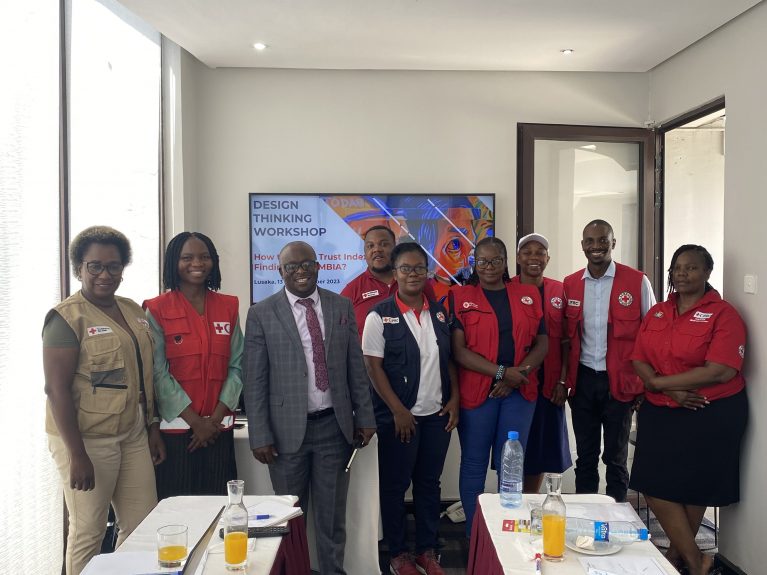Zambia
Background
The Community Trust Index (CTI) is a measurement tool used by Zambia Red Cross to assess and monitor the level of trust in their work. It evaluates trust in multiple dimensions including competencies such as reliability, technical proficiency and experience, and values such as ethics, integrity, and transparency. The community index was conducted in Southern and Eastern provinces using a mixed approach. This page presents key results and findings.
Lead: Zambia Red Cross
Partners: IFRC Africa, Ground Truth Solution
Modules
Overall ScoreIndex scoreThe overall score is the average of the competences and values scores. The competency and values scores are the arithmetic mean of the scores for each sub-dimension. The sub-dimension scores are generated from the weighted average of the response rates to the questions relating to each sub-dimension, using the following weightings.
Results
The Community Trust Index (CTI) evaluates trust across various dimensions, including competence (reliability, technical proficiency) and ethics (integrity, transparency). By providing a comprehensive understanding of community trust, the CTI identifies areas for improvement and enhances the organization's impact. It aids Zambia Red Cross Societey (ZRCS) in measuring effectiveness, meeting community needs, and making informed decisions. Regular CTI data analysis enables program and service enhancements, strengthens community relations, and demonstrates accountability to stakeholders, bolstering the organization's reputation and credibility.
The Zambia Red Cross piloted the Community Trust Index in 4 districts : Katete, Petauke (Eastern province) and Mazabuka, Choma (Southern Province). A total of 1050 participants were purposively sampled for the study. With support from Ground Truth Solutions, the Zambia Red Cross Society piloted the Community Trust Index in 4 districts of the Southern and Eastern provinces.
Community trust by population profile
The Community trust in the Zambian Red Cross can vary among different population groups, including volunteers, people receiving support from the ZRCS, and the general population. To limit the oversampling of people who already donate to the Red Cross which affect significantly the score, we considered only non-donors to analyse perception through the following subdimensions and across population profile (248 out of 1050 respondents). The score are weighted based on age and gender.
Volunteers
Volunteers are individuals who actively participate in various Zambia Red Cross programs, initiatives, or projects.
People receiving support
Individuals who directly receive benefits or support from Zambia Red Cross programs, such as social welfare, healthcare, or education initiatives.
Others
Individual who do not receive benefits or support from Zambia Red Cross programs or engaged with the Zambia Red Cross in general
Perceptions of community trust
It's important to note that community trust is influenced by a range of factors beyond the population groups above, such as competencies or ethical values. The analysis of the perception of trust shows high level of score through competencies and values dimensions. With respectively 8.24 and 8.27, the score for competency and value are high and demonstrate a high level of trust in these 4 districts. However, the examination of the subdimension shows some lower scores mainly in the Value dimension such Engagement (7.74) and Transparency (7.24). This result would require further qualitative analysis and understanding, especially considering the context of the Red Cross intervention in these 2 provinces.
- Overall
- Volunteers
- Beneficiaries
Competencies
Values
Geographic analysis
Summary ReportIn absence of appropriate sample of non-donors respondents, we only considered respondents who know the Red Cross to the geographcial analysis (753 out of 1050). The analysis demonstrates Choma and Katete are the highest rates in both dimensions when Petauke and Mazabuka have the lower score.
Competencies
Top 3
Bottom 3
Values
Top 3
Bottom 3
Findings
The data shows a high level of trust in ZRCS within the communities involved. The results for the four districts where ZRCS operates show that communities, particularly beneficiaries and volunteers, trust the organisation. The relatively lower scores among people who work with or receive aid from ZRCS shows that working closely with communities significantly increases the level of trust between the organisation and community members. However, there are lower scores for transparency and commitment, suggesting that ZRCS may be reluctant to publicly acknowledge significant mistakes in the delivery of aid, as well as a lack of community involvement.
Building community trust was a critical aspect of ZRCS's work. It was a process that involved building relationships, communicating openly and transparently, being responsive, working in partnership, being transparent about operations and finances, promoting community empowerment and ownership, and demonstrating the impact of its work. It took time and effort to build trust, but it was essential for ZRCS to be able to effectively serve and empower communities. ZRCS should communicate openly and transparently, involve community members in decision-making, build partnerships, be responsive, operate with integrity and accountability, and demonstrate impact.
In summary, community engagement and accountability were essential for ZRCS to build trust with community members and achieve its goals. Community engagement helped to ensure that the needs and priorities of the community were met, while accountability helped to build trust by demonstrating the NGO's commitment to ethical principles and responsiveness to community needs and concerns.
The following recommendations were developed through a design thinking workshop with branch members, volunteer feedback and Red Cross staff to improve the approach to community engagement in these 4 districts and increase the effectiveness of sector programmes through better collaboration with communities.
-
Communicate openly and transparently
Share information about your organization's goals, programs, and activities with community members. Be open to feedback and concerns and respond to them in a timely manner.
-
Involve community members in decision-making
Encourage community members to take an active role in the design and implementation of programs and services. This can help build trust by showing that you value community input and are committed to meeting their needs.
-
Build partnerships
Collaborate with other organizations and community leaders to achieve common goals. This can help to build trust by showing that you are committed to working together to address community issues.
-
Be responsive
Regularly conduct community assessments to identify priorities and needs, and be open to feedback and suggestions from community members.
-
Promote community empowerment and ownership
Encourage community members to take an active role in addressing their own issues and in decision-making.
Story from Zambia
Lusaka – In the landscape of community resilience, trust is the cornerstone upon which effective partnerships are built. Now, more than ever, it’s essential to foster strong relationships between communities and organisations like the Zambia Red Cross. Recognising this imperative, we are hosting a workshop in Lusaka in November 2023 that promises to ignite meaningful dialogue and co-create actionable strategies to strengthen trust and collaboration.
At the heart of our initiative lies the Community Trust Index data analysis, a comprehensive exploration of trust dynamics in two distinct regions. This data serves as our compass, guiding us through the nuanced terrain of community perceptions, expectations, and concerns. By understanding these insights, we pave the way for targeted interventions that resonate with the lived realities of those we serve.
The Human-Centered Design Imperative
Central to our approach is the approach of Human-Centered Design (HCD), a methodology that places the needs and experiences of individuals at the forefront of problem-solving. In our workshop, participants will embark on a journey of empathy and ideation, harnessing the power of collective creativity to envision a future where trust between communities and the Red Cross flourishes.
What sets this workshop apart is the diversity of voices it brings to the table. Branch members, Red Cross representatives, and additional stakeholders alike converge in a space of mutual respect and collaboration. Here, every perspective is valued, every story heard. Together, we co-create solutions that transcend conventional boundaries, rooted in the shared goal of building resilient, trust-based relationships.
From Insights to Action: Crafting Sustainable Solutions
Our ultimate aim is not merely to dissect data but to catalyze tangible change. Through interactive sessions and hands-on exercises, participants will translate insights into action plans and recommendations tailored to the unique context of each region. These initiatives are not fleeting gestures but enduring commitments to fostering trust, transparency, and mutual respect.
Sampling
Population
- All Respondents
- Men
- Women
Region
Age Group
Limitations
The survey sample is designed only in Katete, Petauke, Mazabuka and Choma districts and do not represent the full province. Also, the survey is only implemented in provinces where ZRCS implements its programme and may influence the perception of trust.
We excluded people who had never heard of the IFRC and analysed the data of 753 respondents from the original sample of 1050. For population profile, in order to understand the relationship with ZRCS, we only considered the analysis on people who never donate to ZRCS. Male population are oversampled specially for 18-25 and 34-45 age groups and required a post-strafication processing based on age.
The Community Trust Index
The Community Trust Index, developed by the IFRC Community Engagement and Accountability (CEA) Unit, is an evidence-based tool to measure and enhance trust between humanitarian organizations and the communities they serve. The Community Trust Index is measured through Competencies and Values.
 Mongolia
Mongolia  Nepal
Nepal  Tuvalu
Tuvalu  Zimbabwe
Zimbabwe 